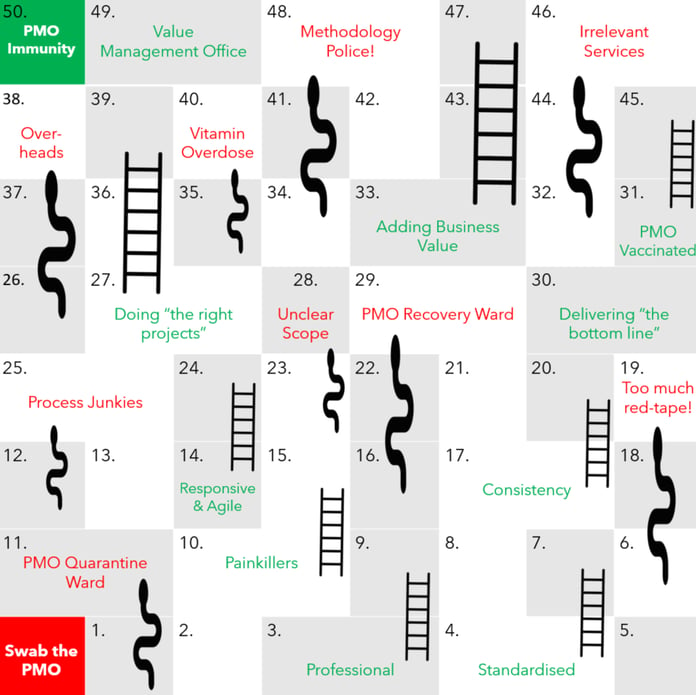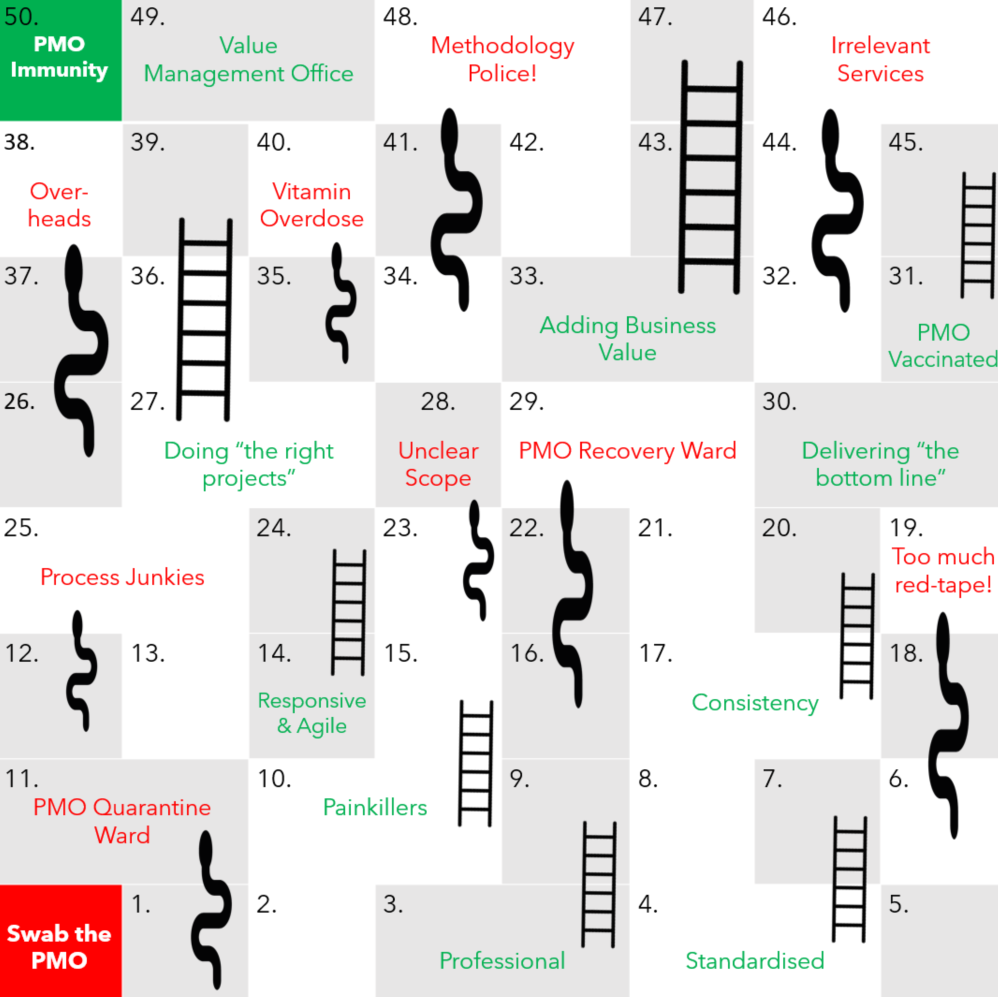The current COVID-19 crisis has shone a light on many Project Management Offices (PMOs) and triggered leadership teams to seek support from entities that they have supported and funded over the years. While there’s no definitive playbook for how to plan and manage projects effectively, given the constraints of the pandemic, nonetheless senior management teams are looking to the PMO for guidance and direction. For those PMOs who are struggling to step up, some fundamental questions are being posed including whether there is any value in having a PMO at all? Our analysis suggests that, in their current guise, many PMOs are unlikely to survive the pandemic.
Over the last 6 months we have conducted two surveys, one pre- and one post-COVID-19. The results have been remarkably consistent. Just over 50% of those we polled reporting that their PMO does not add value, or is not seen as adding value, with a further 10% not sure whether it does. We were interested in getting some insights as to why some PMOs are in poor health and indeed whether they can recover in the fight to keep projects alive.[1]
Project Management Offices (PMO) during COVID-19
With project personnel and customers being asked (if not ordered) to work from home, we are faced with the challenge of managing and delivering projects via virtual / hybrid teams for the foreseeable future.
Therefore, irrespective of whether PMOs are strategic or delivery orientated, there is an expectation that consistency and standardisation are the cornerstones from which PMO services must be leveraged to deliver the portfolio of projects. Consistency and standardisation imply that PMOs, at a minimum, have developed a set of project management processes and procedures to support the delivery of projects and programmes. The better PMOs will have codified these practices under an effective governance framework to facilitate decision making throughout the projects’ life cycles. Of course, without these frameworks and processes being available via on-line repositories and linked to Project Management Information Systems (PMISs), organisations will struggle to cope with multiple projects, different funding/sponsor agendas, stakeholders, and priorities.
So – how does your PMO measure up to the challenge?
In the survey when asked the question “Do you see a risk of the PMO being furloughed in the aftermath of COVID-19”, only 42% of respondents thought that their PMO would not be furloughed. The majority of the respondents were resigned to the fact that they would be sidelined, linked to the perception that they did not provide enough value to the organisation and were therefore not viewed as an “essential service”. PMO personnel do not appear, according to the feedback, to be considered “frontline workers” in the battle to save and deliver projects. For those PMOs who are furloughed one can only wonder how many of them will return and in what capacity?
Interestingly, there were some polar views expressed as to whether the services they provided would be more or less relevant in the aftermath of COVID-19. Over 75% were of the view that the services provided by the PMO remain relevant, with only 25% of the audience suggesting that the services provided are now less relevant. This would point to some positives and would suggest that mature PMOs are indeed able to provide the guidance and direction and more importantly the tools to manage the portfolio of projects effectively.
Other PMO Issues that the COVID-19 lockdown has surfaced
When checking with the PMO community on their views of the relevance of PMOs in the COVID-19 era, a number of open questions were also framed to solicit the reflections and considered thoughts of these informed stakeholders. Opinions were broadly split down the middle as to whether the PMO is more or less relevant, given the increased home-based virtual teams that have now become the ‘norm’ in the COVID-19 era. As to respondents who viewed the PMO as being less relevant, they gave the following reasons:
- “I feel that the PMO needs to adapt and provide information on how to manage projects remotely …. Need to leverage tools to support the portfolio.”
- “PMO is less visible and it now has much lower profile with everyone working remotely.”
- “Management busy fire-fighting now and calling on most other units to contribute. Projects have been put on hold and new projects are so urgent that there is little time to follow the PM methodology, devote time to planning, etc. In short there is a sense of urgency and it seems that we no longer play a key role in delivering the objectives.”
- “Our services are still relevant but the immediacy of addressing the likes of BAU and crisis management quickly did not materialize – we were perceived as being ‘too slow’ – “Where are the Processes”!
- “Our PMO is based upon a waterfall methodology which has been shown up as too slow for the current requirements. The faster more agile methods that have come to the fore recently have – maybe temporarily – somewhat left the PMO in the dust.”
It is clear from the surveys and the feedback that surfaced at the panel discussions and webinars which reflected on the points arising from the surveys, that many PMOs are suffering as they have lost their ‘focus’ or indeed some of them might never have had a ‘focus’ to lose in the first place. Others are seen as a burden or worse, an ‘overhead,’ rather than the supporting entity they once purported to be. Indeed, PMOs often serve merely as reporting entities or “methodology cops and whistle blowers” for “management” and lose sight of what their role is, whether this remit is operational or strategically focused.
In the COVID-19 era, it does not help that some leadership teams are not clear what the PMO does. This coupled with the finding that a significant minority of PMO Managers do not believe that their own PMOs are adding enough value to their organisation suggests that: [2]
- Unless PMOs are clear what their remit is and indeed that the services that they offer are in line with the needs of the company then ‘closing down’ notices should be printed.
- If the leadership team does not take the time to understand the services that the PMO offer and reflect on whether these are the ‘right services’ then the PMO should be ‘quarantined’.
So, what will become of the PMOs who are not deemed as providing essential services? Can a cocktail of project pharmaceutical substances or an injection of bleach cleanse these PMOs from the irrelevance that some of them now seem to be facing?
In the forums that discussed and reflected on these points, it was clear that some of the Senior PMO personnel feel that the ‘Closing Down’ notices might well apply to them and they are struggling to see a way out. Unless an ill PMO can become relevant and add value quickly then they will be deemed an overhead and remain furloughed, perhaps never to return. There are no vaccines available, but the following diagnosis grid might help sign post the way out of the quarantine ward.
PMO Health & Hazards Diagnosis Grid

In summary, our research suggests that many PMOs will not survive in the post-COVID-19 era. The reason is multifaceted. In some cases, the PMO has lost its relevance and its focus. For others, they never had either! Senior management don’t consider the PMO “essential services” or “frontline workers” but a burden and overhead to be sacrificed in these times. Many PMO leaders themselves question the value of their own office or struggle to communicate its nature and how it should be judged to management.
However, the PMOs that are agile, responsive and add business value are making a difference, with the research also revealing that the services these PMO deliver are indeed essential and very frontline! Therefore, the right vaccine is a concoction of three ingredients: understand the nature of your PMO, focus on delivering business value and make sure that all the stakeholders involved are effectively engaged to ensure the PMO services remain relevant.
Shifting the focus of the PMO up the value chain as opposed to being perceived as an overhead starts with a different way of thinking about a PMO’s contribution to the business. Some PMO’s have adapted quickly to the crisis and are an integral part of how Project Portfolios have been rebalanced and reprioritized. This resiliency is needed to ensure that PMOs remain relevant because an injection of bleach won’t cure the underlying conditions!








